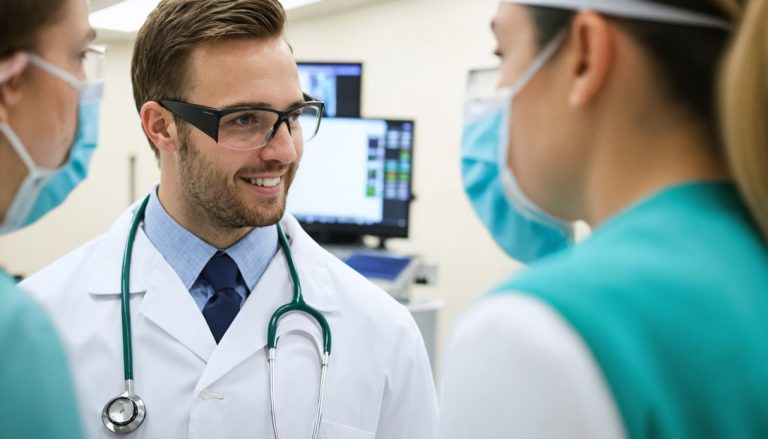
- Arkansas Tech University and St. Mary’s Regional Medical Center are collaborating to align education with modern healthcare needs.
- The focus is on adapting education to meet the evolving skills required in the healthcare industry.
- Debates about future demands emphasize innovative educational strategies and employment pathways.
- Arkansas Tech University is committed to training healthcare professionals with up-to-date skills for current medical challenges.
- The collaboration highlights the importance of integrating practical application with academic learning.
- Representatives’ hospital tour showcased the real-world impact of their educational innovations.
- This partnership serves as an example of the transformative potential when academia and healthcare work together.
- The alliance underscores collaboration as essential to advancing healthcare innovation and meeting community needs.
The rhythmic murmur of determination resonated through St. Mary’s Regional Medical Center as representatives from Arkansas Tech University converged with healthcare leaders to forge pathways to a healthier future. This vibrant collaboration seeks to recalibrate the symbiotic partnership between education and practical medical application, one conversation at a time.
Inside the bustling halls, the discussion delved into the ever-evolving landscape of healthcare. As patient needs grow and diversify, so too must the workforce. What skills does the future demand? This was the question at the heart of an energetic debate, highlighting the need for innovation in educational requirements and new employment strategies that cater to an industry in flux.
Arkansas Tech University, renowned for its commitment to adaptive learning, is strategically positioned to respond to these shifts. It stands ready to mold a new generation of healthcare professionals, equipped with up-to-date skills essential for modern medical challenges. Both endeavors focused on developing curricula that mirror the current demands seen at the frontlines of healthcare.
Following their animated dialogue, university representatives wandered through the hospital’s state-of-the-art facilities, which pulse with the life-saving activity of devoted practitioners. Here, knowledge leaps from textbook pages into real-world application. This tour underscored the tangible outcomes of their collaboration: a workforce ready to meet the demands of today’s healthcare complexities.
As these two forces unite, the promise of a healthier tomorrow sparkles on the horizon. This meeting marked not just an exchange of ideas but a commitment—a promise to anticipate and address the healthcare needs of communities by weaving education and practice into a seamless tapestry of excellence.
This alliance serves as a beacon of what can be achieved when academia and healthcare unite with a shared purpose. As medical demands evolve, so too will the educational paradigms that nurture the caretakers of our future. Here, the key takeaway is clear: Collaboration is not merely advantageous but necessary to propel healthcare into a new era of innovation and care.
How Innovative Collaborations Are Shaping the Future of Healthcare Education
Exploring the Partnership Between Arkansas Tech University and Healthcare Industry Leaders
The dynamic collaboration between Arkansas Tech University (ATU) and St. Mary’s Regional Medical Center highlights the transformative potential of combining academic excellence with practical healthcare applications. This partnership focuses on aligning educational programs with the rapidly changing demands of the medical field, ensuring that future healthcare professionals are fully equipped to handle modern challenges.
Key Skills for Future Healthcare Professionals
In the ever-evolving healthcare landscape, certain skills are becoming increasingly crucial:
1. Telemedicine Proficiency: Understanding and utilizing telehealth platforms to reach patients remotely.
2. Data Analytics: The ability to analyze large sets of health data to inform treatment and improve patient outcomes.
3. Cultural Competency: Skills to effectively interact with diverse patient populations.
4. Critical Thinking and Problem Solving: Identifying complex problems and implementing effective solutions in high-pressure situations.
5. Interprofessional Collaboration: Working seamlessly within multidisciplinary teams to provide comprehensive care.
How-To Steps & Life Hacks for Aspiring Healthcare Workers
– Engage in Continuous Learning: Adapt to new treatments and technologies by taking online courses or attending workshops.
– Enhance Communication Skills: Participate in public speaking courses or workshops to improve patient interaction.
– Gain Real-World Experience: Volunteer or intern at healthcare facilities to understand day-to-day operations and patient needs.
– Build a Network: Connect with healthcare professionals and join relevant organizations for mentorship and opportunities.
Real-World Use Cases
The partnership aims to create innovative courses that mirror real-world scenarios encountered in healthcare settings. For example, simulations of emergency situations provide students with valuable hands-on experience.
Market Forecasts & Industry Trends
With the increased reliance on digital technology in healthcare, there is an anticipated growth in jobs requiring expertise in health informatics. The demand for healthcare professionals is expected to rise by 15% over the next decade, according to the U.S. Bureau of Labor Statistics.
Insights & Predictions
The partnership between ATU and healthcare leaders is predicted to set new standards in healthcare education, producing graduates who are not only knowledgeable but adaptable to future industry shifts.
Key Recommendations
– For Students: Focus on acquiring a broad skill set that includes both traditional medical knowledge and tech-savvy capabilities.
– For Educators: Continuously update curricula to reflect current industry needs and integrate experiential learning opportunities.
– For Healthcare Organizations: Engage with academic institutions to ensure a steady pipeline of well-prepared professionals entering the workforce.
Conclusion
The collaboration between academia and healthcare is not just beneficial but essential for addressing future healthcare challenges. Such alliances ensure that the workforce is prepared to meet the demands of an increasingly complex medical field.
For more insights on innovative healthcare education, visit Arkansas Tech University and see how they are leading the charge in preparing the next generation of healthcare professionals.



